Embracing a Personalized Approach to Mental Wellness
The landscape of mental health care is evolving rapidly towards integrative and personalized strategies that cater to the unique needs of each individual. With the convergence of technological advances, holistic paradigms, and collaborative care models, personalized mental health treatment is becoming more precise, comprehensive, and effective. This article explores how integrating biological, psychological, social, and environmental factors informs tailored mental health interventions, supported by research, innovative technologies, and whole-person care principles. It also highlights practical applications and future directions in delivering optimized mental health outcomes through integrative care.
Foundations of Personalized Mental Health Strategies within Integrative Frameworks
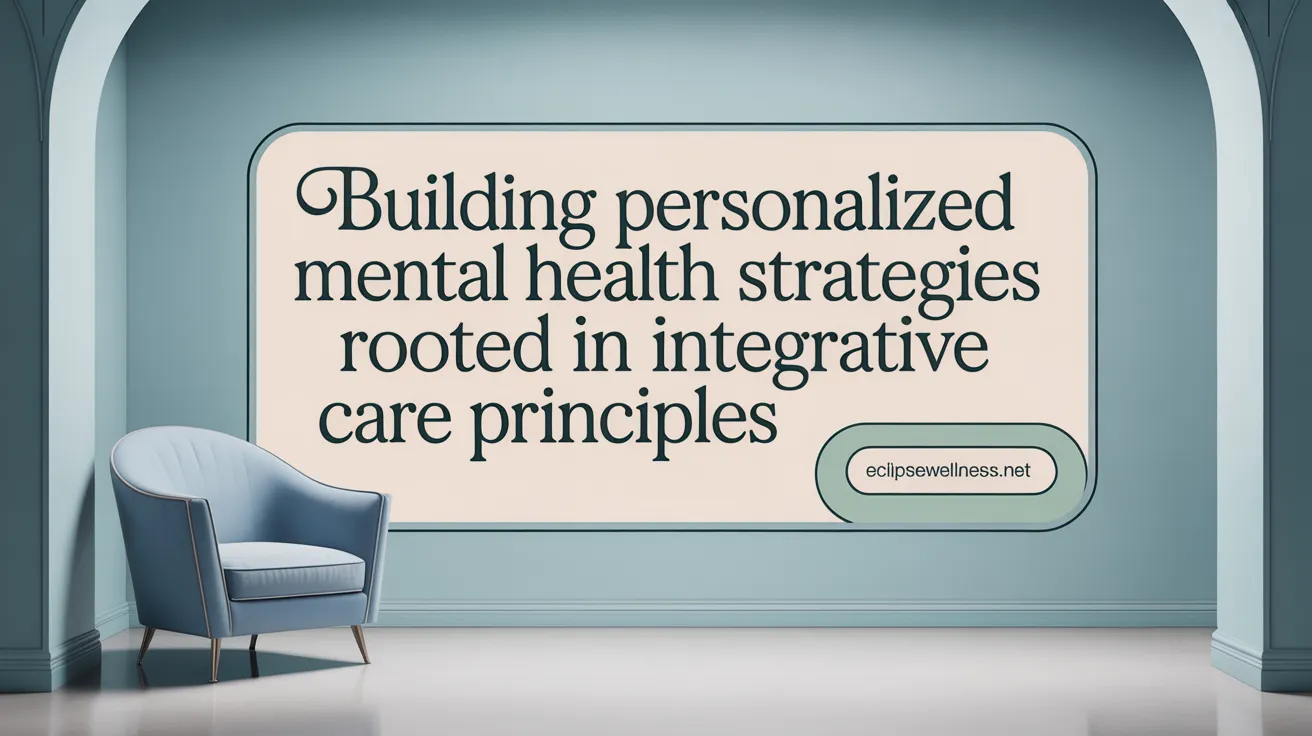
What are the fundamental principles behind personalized mental health strategies within integrative care frameworks?
Personalized mental health care is rooted in the idea of adapting treatments to each individual's unique needs, preferences, and circumstances. Within an integrative framework, this approach considers biological, psychological, social, and environmental factors to develop a holistic treatment plan. The foundational principle emphasizes thorough assessment, including genetic testing, neuroimaging, lifestyle insights, and personal history, to understand the diverse influences on mental health.
Care strategies are tailored by involving multidisciplinary teams, such as psychiatrists, psychologists, nutritionists, and holistic practitioners, to leverage evidence-based practices and decision support tools. Incorporating lifestyle modifications, mind-body therapies, and social interventions helps address root causes and improve outcomes.
Active patient involvement is crucial. Involving individuals in shared decision-making fosters engagement, motivation, and adherence to treatment plans. Flexibility is also essential; ongoing re-evaluation allows adjustments based on patient progress and changing needs.
Addressing social determinants of health, such as socioeconomic status and cultural background, ensures care remains relevant and accessible. This comprehensive, patient-centered approach ultimately leads to more effective, sustainable mental health management within the integrative paradigm.
The Integral Role of Whole-Person Care in Mental Health Support
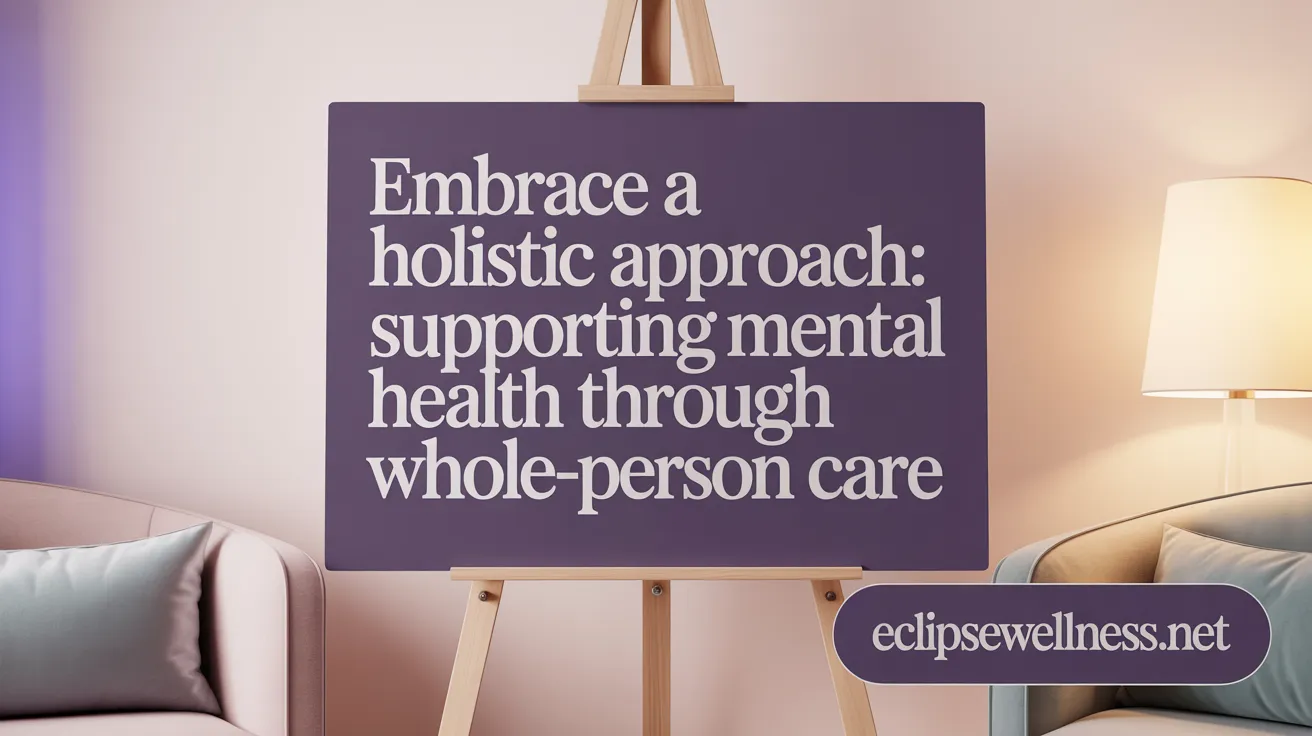
What is the role of comprehensive, whole-person care in supporting mental health?
Whole-person care plays a crucial role in mental health support by addressing all facets of an individual's life that influence well-being. This approach considers not just the physical health of a person but also their emotional state, social connections, and spiritual beliefs. By doing so, it creates a more complete picture of what contributes to mental health challenges and what promotes resilience.
In practice, whole-person care integrates various services—medical treatment, psychological therapies, social support, and spiritual care—into a cohesive plan tailored to the individual's needs. This holistic strategy ensures that underlying factors such as lifestyle, environment, and personal values are taken into account, fostering deeper engagement in treatment.
Programs like the VA Whole Health System exemplify this approach by emphasizing patient-centered strategies that focus on health promotion throughout the lifespan. These models actively involve patients in their care planning, respecting their preferences and goals. The result is a more meaningful recovery process and sustained well-being.
Research supports the benefits of this approach, indicating improvements in mental health outcomes and reductions in hospitalizations and healthcare costs. Overall, whole-person care advocates for a balanced, integrated model that nurtures the mind, body, and spirit, leading to more resilient and healthier individuals.
Enhancing Mental Health Support through Holistic and Tailored Approaches

How do holistic and tailored approaches enhance mental health support?
Holistic and personalized strategies significantly improve mental health care by focusing on the entire individual. Instead of solely targeting symptoms, these approaches integrate physical health, emotional resilience, spiritual life, and personal values to deliver comprehensive treatment plans. By considering factors such as lifestyle, cultural background, and personal preferences, providers tailor interventions that resonate more deeply with each person.
Practices like proper nutrition, mindfulness exercises, movement therapies like yoga or tai chi, and community engagement are backed by scientific research showing their ability to reduce stress, anxiety, and depression. Incorporating these methods helps address the root causes of mental health issues and promotes long-term well-being.
Moreover, holistic care fosters stronger therapeutic relationships. When patients feel understood and respected within a trusting environment, they are more likely to engage actively in their recovery process. Empathy, trust, and shared decision-making are vital components that reinforce treatment success.
By blending traditional psychiatric treatments with holistic practices, mental health care becomes more sustainable and effective. This integrative approach not only alleviates symptoms but also enhances self-awareness, emotional regulation, and resilience. Overall, holistic and tailored methods provide a personalized pathway to mental health that supports long-lasting recovery and personal growth.
Advances in Research Supporting Personalized Psychiatric Treatment
What current research supports personalized psychiatric treatment methods?
Recent studies in precision psychiatry have made substantial progress in developing tailored treatment strategies for mental health conditions. Researchers are now integrating biological, genetic, neuroimaging, and psychosocial information to customize interventions effectively.
One significant area is neurobiological subtyping. Using functional magnetic resonance imaging (fMRI) and brain circuit analysis, scientists have identified distinct neurobiological profiles within disorders like depression and schizophrenia. These insights have led to targeted therapies, such as transcranial magnetic stimulation (TMS), which can be directed at specific brain circuits involved in a patient's unique disorder.
Genetics also plays a crucial role. Advances in genomics, particularly polygenic risk scores and analysis of genetic variants, help predict who may develop certain mental illnesses and determine the most effective medication with fewer side effects. Pharmacogenomics enables clinicians to select drugs based on an individual’s genetic makeup, improving treatment outcomes.
Moreover, machine learning and artificial intelligence are transforming how data is used in psychiatric care. These tools analyze electronic health records, neuroimaging results, and digital behavioral data to forecast treatment responses and identify those at higher risk for suicide or relapse. Machine learning models can synthesize complex datasets to create predictive algorithms that assist clinicians in making more informed decisions.
Overall, this multidisciplinary approach, combining neurobiological insights, genetic profiling, and advanced data analytics, is forging a new era of personalized mental health treatment. These innovations promise more effective, early, and precise interventions tailored to each individual's unique biological and psychosocial profile.
| Research Area | Techniques Used | Benefits | Example Applications |
|---|---|---|---|
| Neuroimaging | fMRI, brain circuits | Identify subtypes, target therapies | TMS for circuit-specific depression |
| Genetics | Polygenic scores, variants | Predict risk, medication response | Personalized pharmacotherapy |
| Data Analytics | Machine learning, AI | Improve prediction, response | Suicide risk prediction models |
| Integration | Multimodal biological and psychosocial data | Holistic, precise treatment | Tailoring therapies based on comprehensive profiles |
Therapeutic Modalities and Collaborative Care Models in Personalized Mental Health
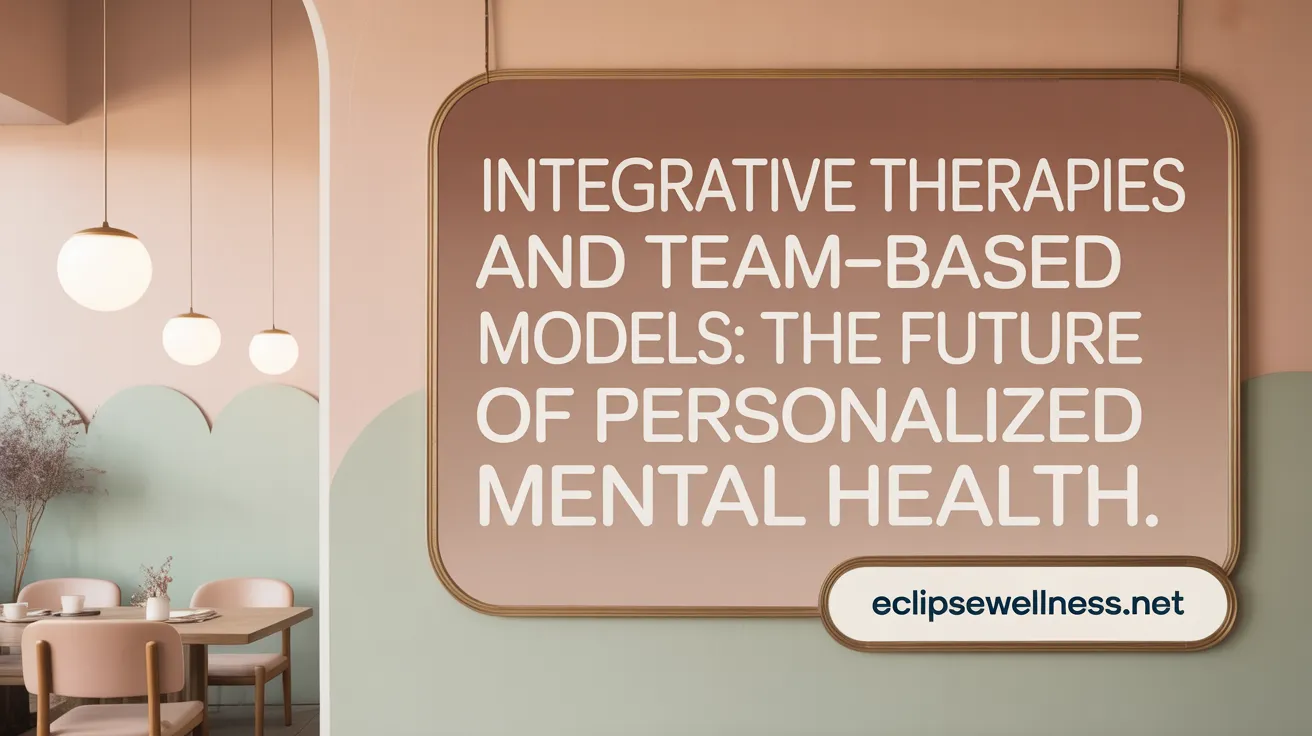
Which therapeutic modalities and collaborative care models are commonly integrated in personalized mental health care?
Personalized mental health treatment often combines various evidence-based psychotherapies tailored to individual needs. Cognitive-behavioral therapy (CBT) is a foundational approach that helps patients identify and modify negative thought patterns. Dialectical Behavior Therapy (DBT) is particularly effective for emotional regulation and borderline personality disorder, while mindfulness-based therapies promote present-moment awareness to reduce stress and enhance emotional resilience.
Holistic strategies also play a role in personalized care. Practices such as yoga, expressive arts, and nutritional counseling support overall well-being. When appropriate, pharmacological treatments are personalized through genetic profiling and pharmacogenomic testing, which can predict medication response and reduce adverse effects.
An essential aspect of contemporary mental health care is the use of collaborative models like the Collaborative Care Model (CoCM). These involve multidisciplinary teams, including primary care physicians, psychiatrists, care managers, and pharmacists, working together using shared records and regular case discussions.
Measurement-based care, employing tools like PHQ-9, GAD-7, and other monitoring instruments, guides treatment adjustments and tracks progress effectively. Technology plays a crucial role here, providing telehealth services, mental health apps, and data analytics to support continuous care.
The adaptability of these models allows they to serve diverse populations, including older adults, women with perinatal depression, and individuals with comorbid substance use disorders. Advanced interventions like Transcranial Magnetic Stimulation (TMS) are integrated into personalized care plans for treatment-resistant cases.
Overall, these integrated treatment strategies foster a comprehensive, patient-centered approach. By combining evidence-based therapies, pharmacogenomics, holistic practices, and team-based care, they aim to enhance treatment outcomes, improve patient satisfaction, and optimize health system efficiency.
Integrating Personalized Medicine into Mental Health Practices
How is personalized medicine integrated into mental health practices?
Personalized medicine in mental health is becoming increasingly sophisticated, relying on a wealth of individual-specific data to inform diagnosis and treatment. Clinicians now utilize genetic information, neurobiological markers, and brain imaging techniques to better understand the underlying mechanisms of mental disorders.
Advances in digital tools, such as electronic health records and wearable devices, facilitate real-time data collection through digital phenotyping. These technologies help track behavioral patterns, mood fluctuations, and physiological responses, offering a comprehensive view of the patient's health status.
Artificial intelligence and data analytics play a central role in processing vast amounts of clinical data. Machine learning models are being developed to predict treatment responses, identify at-risk populations, and tailor intervention strategies more accurately.
Pharmacogenomics—the study of how genes influence medication responses—enables clinicians to select the most effective drugs with the least side effects for each individual. This approach reduces the trial-and-error period often associated with psychiatric medication management.
Brain imaging and neurocircuitry analyses further refine personalized treatment plans by identifying specific circuit dysfunctions associated with conditions like depression, schizophrenia, and anxiety. These insights support targeted therapies such as transcranial magnetic stimulation (TMS) or tailored psychotherapy.
Ongoing research initiatives, including efforts by the WPA's Scientific Section on Personalized Psychiatry, emphasize interdisciplinary collaboration combining neuroscience, biomarkers, big data, and clinical expertise. This collaborative approach aims to develop predictive models and novel treatment modalities.
The future of personalized mental health treatment holds promise for wholly individualized care, reducing treatment resistance and improving overall outcomes. As research progresses, integrating biological, psychological, and social factors into a cohesive treatment strategy is the goal to achieve more effective and compassionate mental health care.
Benefits and Methods of Implementing Integrative Mental Health Strategies
What are the benefits and implementation methods of integrative mental health strategies?
Integrative mental health approaches bring several practical advantages. They improve overall treatment effectiveness by addressing multiple facets of a patient's well-being—mental, physical, emotional, and social. This holistic focus often results in better patient engagement, higher satisfaction, and greater adherence to treatment plans.
A significant benefit is the reduction of adverse effects associated with traditional pharmacological treatments. Combining medications with complementary therapies such as mindfulness, yoga, acupuncture, and art therapy minimizes side effects while enhancing therapeutic outcomes.
These strategies promote a deeper understanding of the patient's needs by considering root causes, including biological, psychological, social, and environmental factors. Such comprehensive assessment leads to more personalized care, supporting sustainable recovery and better health outcomes.
Implementation methods are diverse and adaptable. Co-locating healthcare providers—bringing together mental health professionals, holistic practitioners, and primary care clinicians—facilitates seamless collaboration. Telehealth services expand access, enabling ongoing support regardless of geographical barriers.
Community education campaigns raise awareness about holistic mental health practices, encouraging more individuals to participate in integrative care.
Personalized, goal-based care plans are central, involving patients actively in their treatment decisions to boost motivation and ownership.
Overall, these strategies exemplify a comprehensive, patient-centered model that recognizes the interconnectedness of mind and body. Combining evidence-based medical treatments with holistic therapies not only enhances recovery but also promotes health equity, making mental health care more effective and accessible for diverse populations.
Innovation Trends and Future Directions in Personalized Holistic Mental Health Care
What innovation trends and future directions are shaping personalized, holistic mental health care?
The future of mental health treatment is increasingly defined by technological advancements and a broader understanding of holistic care. Emerging trends are driven by digital health tools powered by artificial intelligence (AI) that assist in diagnosing, monitoring, and personalizing treatment plans.
AI-based diagnostic systems analyze vast amounts of data, including genetic, neuroimaging, and psychosocial information, to identify individual patterns and potential risk factors. Virtual therapists and chatbots offer accessible mental health support, especially in underserved communities, and facilitate ongoing engagement with patients.
Wearable devices are transforming monitoring practices, providing real-time data on physiological markers such as heart rate variability, sleep patterns, and activity levels. This continuous data collection enables early detection of mental health issues, timely interventions, and dynamic adjustments to treatment plans.
Immersive therapies like virtual reality (VR) and biofeedback are gaining prominence. VR environments help treat PTSD, phobias, and social anxieties by designing safe, controlled exposure scenarios. Biofeedback techniques train individuals to control physiological responses, supporting stress reduction and emotional regulation.
Community-based and culturally sensitive approaches are essential to ensure that personalized care respects individual backgrounds. By incorporating social determinants of health and cultural preferences, mental health services become more inclusive and effective.
The integration of digital therapeutics, telepsychiatry, and online support platforms enhances access, providing continuous care beyond traditional clinical settings. These tools are particularly valuable for remote or rural populations where mental health resources are scarce.
Looking ahead, establishing robust regulatory frameworks and standards will be critical to ensure safety, privacy, and ethical use of these technologies. Addressing concerns related to data security and informed consent is necessary to build trust.
Combining human empathy with AI-driven insights is the next frontier, promising a balanced approach that leverages technological power while maintaining compassionate care. As research continues, these innovations will support more precise, accessible, and culturally attuned mental health strategies—paving a future where personalized, holistic care becomes the norm.
Personalized and Integrative Methods in Treatment Planning and Prevention
How can treatment planning and preventative strategies incorporate personalized and integrative mental health methods?
Personalized and integrative approaches are transforming mental health care by focusing on the unique needs of each individual. A comprehensive assessment of biological, psychological, social, and environmental factors forms the foundation for tailored treatment plans. This involves collecting detailed data through digital questionnaires, wearable devices that monitor physiological states, and extensive clinical databases.
Advanced decision support tools, including machine learning algorithms and artificial intelligence, play a vital role. These technologies analyze large datasets to generate personalized treatment recommendations, supporting clinicians in making well-informed decisions.
Routine measurement-based care is essential for tracking patient progress over time. Clinicians utilize outcome monitoring tools like PHQ-9, GAD-7, and other assessments to evaluate treatment efficacy regularly. This continuous feedback loop allows for dynamic adjustments, ensuring the treatment remains aligned with evolving patient needs.
Integrative psychiatry merges conventional therapies such as medication and psychotherapy with complementary modalities, including nutritional counseling, mind-body practices, and alternative therapies. This holistic strategy addresses physical, emotional, and social dimensions, promoting overall well-being.
Shared decision-making and active patient involvement are central to successful personalized care. Patients participate in crafting their treatment plans, which enhances engagement, adherence, and satisfaction.
By combining detailed assessments, intelligent decision support, ongoing monitoring, holistic therapies, and collaborative care, mental health providers can deliver more precise, effective, and preventive interventions. These strategies not only improve immediate outcomes but also foster resilience and reduce the risk of relapse, ultimately supporting long-term mental health stability.
The Importance of Whole-Person Mental Health Integration in Senior Care
Mental health challenges in older adults
Older adults often face mental health issues such as depression, anxiety, grief, and social isolation, which are frequently underreported and undertreated. These challenges are compounded by age-related physical health conditions, making mental health a crucial component of overall well-being.
Impact on chronic disease management and hospitalizations
Untreated mental health problems in seniors can complicate the management of chronic diseases, leading to increased hospitalizations and decreased treatment adherence. Recognizing and addressing mental health early within a comprehensive care plan is essential for better health outcomes and enhanced quality of life.
Embedding behavioral health in primary care
Integrating behavioral health specialists into primary care clinics helps improve access and reduces barriers to mental health treatment. Routine screening tools like PHQ-2, PHQ-9, and GAD-7 facilitate early detection of mental health issues and foster meaningful conversations, supporting personalized care.
Culturally competent communication and stigma reduction
Using culturally sensitive communication strategies is vital to reduce stigma, build trust, and engage older adults in mental health care. Training for healthcare providers is key to ensuring respectful and effective interactions, encouraging seniors to seek help and participate actively in their treatment.
Outcomes of integrated mental health care in elderly populations
Research indicates that when mental health services are embedded into routine care, older adults experience reductions in depression and anxiety, improved management of chronic illnesses, fewer emergency visits, and higher satisfaction with care. Whole-person approaches that consider physical, emotional, and social factors help create supportive environments tailored to individual needs.
| Aspect | Benefits | Additional Notes |
|---|---|---|
| Early screening and detection | Prompt intervention | Uses tools like PHQ-9, GAD-7 |
| Collaborative primary care team | Better access and communication | Facilitates real-time updates |
| Culturally competent approaches | Engagement and trust | Reduces stigma and barriers |
| Holistic and integrated treatment | Improved health outcomes | Combines mental, physical, social care |
Effective senior mental health care depends on integrating these strategies into a whole-person, patient-centered model, ensuring that mental health becomes a fundamental part of aging well.
Utilizing Technology to Enhance Personalized and Integrative Mental Health Care
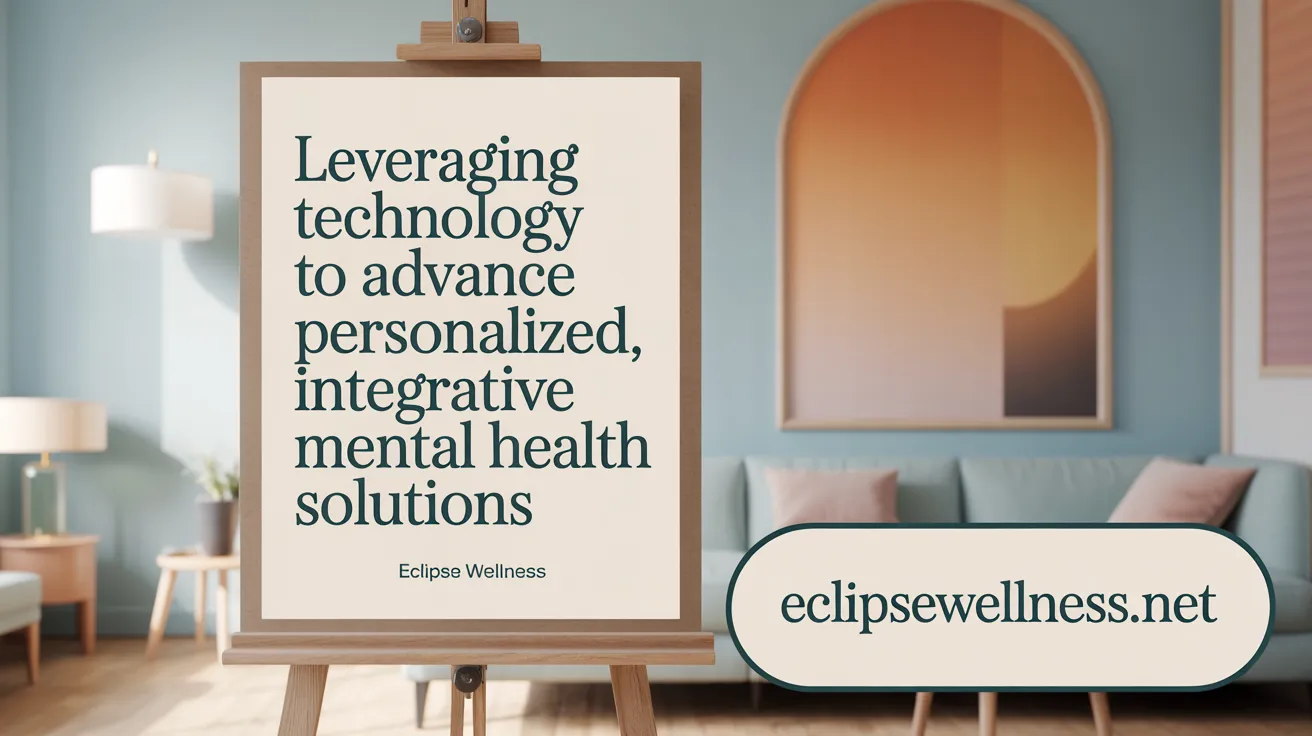
Telehealth services and accessibility
Technology has significantly expanded access to personalized mental health care through telehealth platforms. These services enable patients to consult with healthcare providers conveniently from home, reducing barriers related to transportation, mobility, or geographical limitations. Telehealth also supports ongoing treatment adjustments, ensuring consistent, tailor-made care.
Digital therapeutic platforms and apps
Numerous apps and digital platforms now offer evidence-based interventions such as mindfulness exercises, mood tracking, and cognitive behavioral therapy (CBT). These tools empower patients to actively participate in their treatment plans, encouraging daily practice and self-monitoring. They enhance personalization by adapting content based on individual progress and preferences.
Electronic health records and data integration
EHR systems facilitate comprehensive data collection, allowing clinicians to access detailed medical histories, lifestyle factors, and treatment responses. Integrated data management supports a holistic view of patient health, enabling more precise, personalized care adjustments based on real-time information.
Artificial intelligence in clinical decision support
AI-driven tools are transforming mental health care by analyzing large datasets—such as neuroimaging, genetic profiles, and patient feedback. These algorithms help clinicians identify individualized risk factors, predict treatment responses, and select the most effective interventions, making mental health care more precise.
Real-time monitoring and adaptive care plans
Wearable devices and mobile health apps enable continuous health monitoring, capturing data on activity levels, physiological responses, and mood fluctuations. This information allows for the development of dynamic, adaptive treatment plans that evolve with the patient’s changing needs, enhancing the effectiveness and personalization of care.
Mind-Body Optimization: A Model for Holistic Personalized Mental Health
Mind-Body Connection Principles
Mind-Body Optimization (MBO) is a holistic approach that emphasizes the deep interconnection between mental and physical health. It recognizes that emotional states, thoughts, and physical well-being influence each other, creating a cycle that can either promote healing or exacerbate mental health issues. By focusing on this connection, MBO aims to develop personalized strategies that support overall harmony and optimal functioning.
Evidence-based Therapies Used (CBT, DBT, EMDR)
Central to MBO are established therapeutic techniques like Cognitive Behavioral Therapy (CBT), Dialectical Behavior Therapy (DBT), and Eye Movement Desensitization and Reprocessing (EMDR). These therapies are tailored to individual needs and are effective in addressing issues such as anxiety, depression, trauma, and emotional regulation. Incorporating these modalities allows for personalized care that targets specific psychological patterns and fosters resilience.
Incorporation of Novel Treatments like TMS
Beyond traditional therapy, MBO integrates innovative treatments such as Transcranial Magnetic Stimulation (TMS). TMS uses magnetic fields to stimulate targeted areas of the brain, which can improve symptoms of depression and other mental health conditions resistant to medication. Personalized assessment guides the application of TMS, ensuring that treatment is aligned with each patient’s unique neurobiological profile.
Comprehensive Assessments Including Lifestyle and Preferences
Effective personalization begins with comprehensive assessments. MBO involves evaluating medical history, lifestyle factors, social environment, and personal preferences. Such assessments may include genetic testing, neuroimaging, and lifestyle questionnaires, providing a detailed picture that informs tailored treatment plans. This approach ensures that interventions align with an individual’s overall life context, enhancing engagement and outcomes.
Patient Empowerment and Flexible Care Delivery
Empowering patients is a cornerstone of MBO. The model emphasizes shared decision-making, psychoeducation, and goal setting, fostering a sense of ownership over the healing process. Care plans are flexible, with regular check-ins and adjustments based on patient progress and feedback. Telehealth and remote monitoring facilitate ongoing support, making personalized mental health care accessible and adaptable to evolving needs.
The Role of Patient Education and Shared Decision-Making in Integrative Care
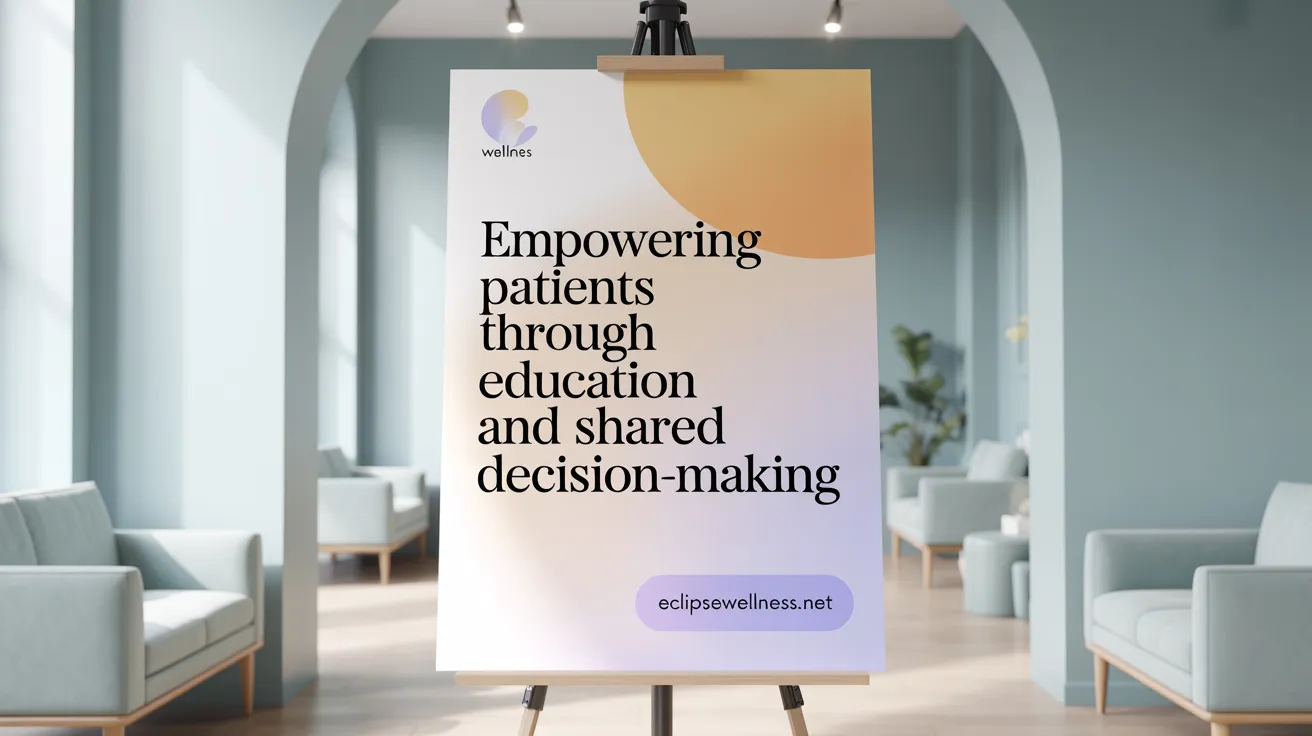
Empowering patients through psychoeducation
Effective integrative care begins with educating patients about their mental health and treatment options. Providing clear, accessible information helps individuals understand their condition, the benefits and limitations of various therapies, and lifestyle factors influencing their recovery. Psychoeducation fosters a sense of control and encourages active participation.
Collaborative treatment planning
Shared decision-making is central to personalized mental health care. Healthcare providers work alongside patients to develop tailored plans that incorporate medical, psychological, and holistic therapies. By considering individual preferences, cultural backgrounds, and personal goals, clinicians create more meaningful and acceptable treatment strategies.
Building therapeutic alliance and motivation
A strong relationship between patient and provider enhances treatment engagement. Open communication, trust, and mutual respect motivate patients to commit to their care plans. Regular dialogue about progress and concerns encourages ongoing collaboration.
Ongoing evaluation and adaptation of therapy
Integrated care requires flexibility. Clinicians continually assess treatment responses using tools like PHQ-9 or GAD-7 and adjust interventions accordingly. This iterative process ensures the approach remains aligned with the patient’s evolving needs and life circumstances.
Enhancing treatment adherence and satisfaction
Patient education and shared decision-making improve adherence by making treatments more relevant and acceptable. When patients feel heard and involved, they are more likely to follow through with therapy, leading to higher satisfaction and better outcomes.
| Aspect | Focus | Outcome |
|---|---|---|
| Psychoeducation | Informing patients about mental health | Empowerment and understanding |
| Shared Decision-Making | Joint planning of treatment | Increased engagement |
| Therapeutic Alliance | Building trust and motivation | Improved adherence |
| Flexibility in Therapy | Regular assessment and adjustment | Sustainment of benefits |
| Patient Satisfaction | Involvement in treatment | Better overall health results |
Addressing Cultural, Socioeconomic, and Ethical Considerations in Personalized Integrative Mental Health
How do cultural and socioeconomic factors impact access to personalized mental health care?
Cultural beliefs, language barriers, and socioeconomic status significantly influence a person's ability to access and benefit from personalized mental health services. Individuals from diverse backgrounds may face obstacles such as financial constraints, transportation issues, or mistrust of healthcare systems, which can limit their engagement with tailored treatments. Addressing these barriers requires culturally sensitive outreach, affordable services, and community-based interventions to ensure equitable access.
How can reducing stigma through culturally competent care improve mental health outcomes?
Stigma surrounding mental health often varies across cultures and can deter individuals from seeking help. Culturally competent care involves understanding and respecting diverse cultural perspectives, which helps build trust and encourages open dialogue. When providers acknowledge cultural identities and incorporate them into treatment, patients are more likely to feel accepted, reducing shame and stigma. This increases engagement and adherence to personalized treatment plans.
What are ethical issues involved in personalized mental health interventions?
Ethical considerations include ensuring informed consent, protecting patient privacy, and maintaining cultural integrity. Patients must understand their treatment options and the use of personal data, such as genetic or neuroimaging information, to make autonomous decisions. Providers must also avoid cultural insensitivity or bias, respecting individual values and social contexts while delivering evidence-based care.
How can interventions be tailored to suit diverse value systems?
Adapting treatment approaches involves exploring patients' beliefs, spiritual practices, and social norms. For example, integrating faith-based support or traditional healing practices can enhance relevance and acceptance. Tailoring also includes respecting personal goals, dietary restrictions, and lifestyle preferences, making the care more effective and sustainable.
Why is promoting health equity vital in integrative mental health care?
Health equity ensures that all individuals, regardless of background or economic status, have access to comprehensive, personalized mental health services. This involves addressing systemic disparities, providing culturally appropriate care, and actively involving underserved populations. Promoting equity leads to better overall outcomes, reduced health disparities, and a more just healthcare system.
| Aspect | Considerations | Strategies |
|---|---|---|
| Cultural sensitivity | Respect diverse cultural beliefs and practices | Culturally informed training for providers, community engagement |
| Socioeconomic barriers | Financial, transportation, and resource constraints | Sliding scale fees, mobile clinics, telehealth |
| Ethical practices | Informed consent, privacy, respect | Clear communication, data protection, cultural competence |
| Customizing interventions | Personal values, family, spiritual beliefs | Collaborative goal setting, integrating traditional practices |
| Promoting equity | Disparity reduction, inclusive policies | Outreach, policy reform, culturally adapted programs |
Towards a Future of Personalized Integrative Mental Health Care
Personalized strategies within integrative mental health care are transforming how mental wellness is supported, delivering treatments that honor the complexity of each individual's biology, experience, and environment. Grounded in whole-person care principles and bolstered by advances in technology, research, and collaborative practice models, these approaches foster more effective, sustainable, and compassionate mental health support. As the field advances, embracing cultural sensitivity, patient empowerment, and innovation will be key to overcoming current challenges and ensuring equitable access. Ultimately, integrating personalized medicine, holistic therapies, and shared decision-making promises a future where mental health care is not only more precise but also meaningfully aligned with patients’ values and life contexts, enhancing quality of life and resilience for diverse populations.
References
- A Pathway to Personalization of Integrated Treatment
- An integrative collaborative care model for people with ...
- The promise of precise, personalized mental health care
- Personalized Care in Mental Health
- Integrating medicine with lifestyle for personalized and holistic ...
- Personalized Mental Health Solutions
- Integrating Mental Health into Whole-Person Care
- The Role of Integrative Health in Mental Wellness
- Why is it Important to Individualize an Integrative Treatment ...
- A Pathway to Personalization of Integrated Treatment
